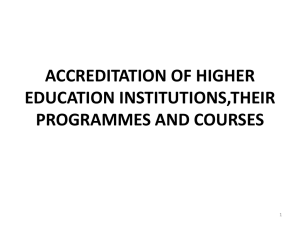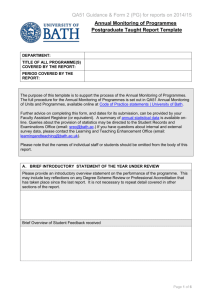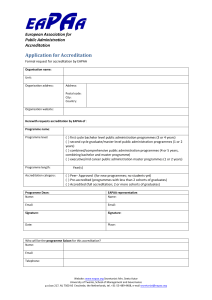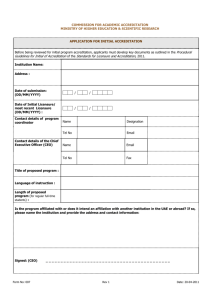LLUkompE
advertisement
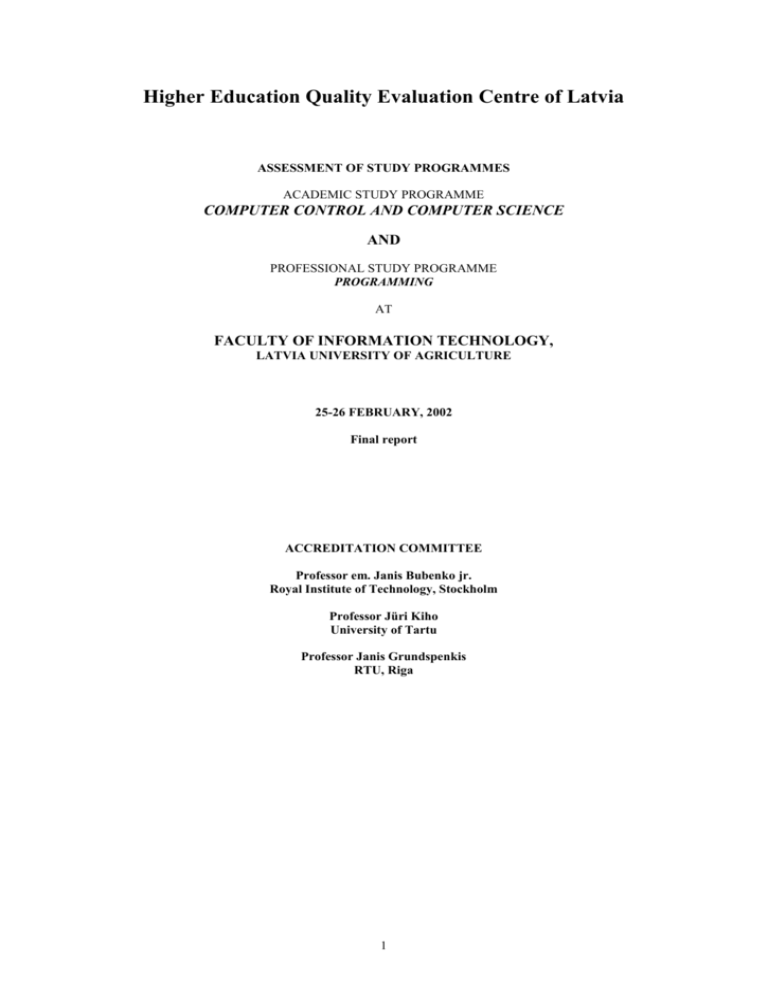
Higher Education Quality Evaluation Centre of Latvia ASSESSMENT OF STUDY PROGRAMMES ACADEMIC STUDY PROGRAMME COMPUTER CONTROL AND COMPUTER SCIENCE AND PROFESSIONAL STUDY PROGRAMME PROGRAMMING AT FACULTY OF INFORMATION TECHNOLOGY, LATVIA UNIVERSITY OF AGRICULTURE 25-26 FEBRUARY, 2002 Final report ACCREDITATION COMMITTEE Professor em. Janis Bubenko jr. Royal Institute of Technology, Stockholm Professor Jüri Kiho University of Tartu Professor Janis Grundspenkis RTU, Riga 1 OVERVIEW The accreditation commission visited Latvia University of Agriculture and Faculty of Information Technology (FIT) during 25th and 26th February 2002. The Evaluation Commission was well received by the members of the Faculty. The visit was professionally arranged, and the commission had possibility to get acquainted with faculty, staff, students, employers, and teaching facilities. The commission met all leading staff of the Faculty, including those responsible for the programs. It also conducted interviews with younger staff members, a group of students (about 50 students, about 25 undergraduate students and about 25 students of the professional program), and a group of potential employers (13) of future graduates of the programs. The commission also attended lectures and laboratory exercises. Also a short trip to the Faculty of Engineering, the Sports Centre, and the students’ hostel was made. The commission had a full access to all supplementary materials of the study programmes, as well as to publications of the teaching staff. A quick tour to the Fundamental Library and the Museum was made. At the end, the accreditation commission conducted an informal meeting with members and students of the Faculty and highlighted some of the strengths and weaknesses of the programs under review. In our opinion, the outcome was a positive and constructive experience for the University. The high quality (correctness and completeness) of presented selfevaluation reports as well as all other supplementary material should be specially noted. This is the final report of the commission. It is structured as follows. First we present some positive impressions of the FIT and the study programmes. Next we give some suggestions for improvement including critical remarks. Finally we present our suggestion concerning accreditation of the two programmes. POSITIVE REMARKS The Faculty has put good effort in developing both programs and it performs their execution carefully. Proper attention is also paid to develop and/or adapt modern teaching/learning methods. The Faculty members demonstrate a high degree of professionalism and the programs they teach in are comparable to other classical universities within Europe. The commission found the structure of the study programmes satisfactory. The inclusion of 20 CP practical training in the professional programme is adequate, but more attention should be paid to quality and organisational aspects of practical work training. The faculty staff is relatively young, the average age of informatics teachers is 35. The selection of students seems good: 1 out of 6 is accepted. The proportion of Ph.D. graduated teachers is acceptable: 12 out of 50. 2 Facilities in terms of rooms and computing and networking equipment meet the requirements of the study programmes. Potential future employers are enthusiastic about the programmes and very much interested in employing students for practical training, as well as for future work. It seems the faculty has also realised the need for individual development of faculty staff and is in the process of developing concrete plans for this. Defence of 6 Ph.D. thesis is expected within 2 years. The students are extremely enthusiastic about the programme so far, including the selection of course topics within the programmes. Other positive factors, contributomg to the success of the programme and its output, are the Zemgale Development Agency promoting IT entrepreneurship in the region, as well as strong interest from companies such as Dati, Lattelekom, and Latvenergo to establish the regional activities in Jelgava. SUGGESTIONS FOR IMPROVEMENT Our greatest concern is the foci of both programmes. The commission recognises that the goals and tasks of the programmes are stated differently, i.e they have different foci. Nevertheless the curricula do not reflect these differences properly. Also, the way of teaching topics of both programmes must differ and the need for practical training in the professional programme must be emphasised. More attention must be paid to the students’ individual work, especially within the academic programme. It could be achieved by increasing the number of term papers. The commission is also concerned about the amount of research performed by the faculty staff in core topics of computer science and in applying computer science to problems in agriculture and regional planning and development. Effort should be directed for improving this situation. The long-term goals and interests of the programs could be more clearly reflected. The possible sub-goal of the academic program – to prepare students for master studies, is not explicitly mentioned. The Faculty does not yet appear to have a clear plan for developing a master program in Computer Science. Lack of such a plan may have a negative influence for further development and growth of the academic program. Students, as well as employers have both pointed out the need to increase possibilities for foreign language studies. This should be considered and possibly implemented as optional courses. A certain lack of applied courses with high-tech topics can also be noted, e.g. distributed systems, parallel and mobile computing, ERP systems, CSCW, etc. 3 SUGGESTIONS FOR ACCREDITATION Despite some critical points, the general feeling of the commission is positive. We are confident the Faculty of Informatics of the Latvia University of Agriculture has a good potential to successfully develop and adopt both programmes to future needs. Our recommendation therefore is: Academic study programme COMPUTER CONTROL AND COMPUTER SCIENCE - accreditation for 6 years. Professional study programme PROGRAMMING – accreditation for 6 years. 15-03-2002 Janis Bubenko jr. Jüri Kiho Janis Grundspenkis INDIVIDUAL REPORT ABOUT ACCREDITATION OF ACADEMIC STUDY PROGRAMME "COMPUTER CONTROL AND COMPUTER SCIENCE" AND PROFESSIONAL STUDY PROGRAMME "PROGRAMMING" OF FACULTY OF INFORMATION TECHNOLOGY AT LATVIA UNIVERSITY OF AGRICULTURE I visited the Faculty of Information Technology (FIT) of the Latvian University of Agriculture on 25th and 26th February 2002. During my visit I had the possibility to get acquainted with faculty, staff, students, employers, and teaching facilities, as well as with the Faculty of Engineering, the Sports Centre, and the students’ hostel. Discussions with students, potential employers and teaching staff were carried out. All necessary supplementary materials of the study programmes, as well as publications of the teaching staff were available. General impression from the visit is consistently good. The staff is relatively young. The average age of informatics teachers is around 35 years. There are 12 Ph.D. graduated teachers (out of 50) that is rather good number for the regional university. Defence of six Ph.D. theses is expected in next two years. The facilities (rooms, auditoriums, computing and networking equipment) meet the requirements of the 4 study programmes. The students are satisfied with contents and teaching of both programmes so far. The potential employers are enthusiastic about the programmes. They are ready to employ students for practical training, as well as for future work. Very positive factor is that the Zemgale Development Agency is promoting IT entrepreneurship in the region. Latvian biggest companies such as Dati, Lattelekom, and Latvenergo have plans to establish the regional activities in Jelgava. I found the structure of both programmes satisfactory. Curricula satisfy requirements for the standardised part of bachelor's study programmes in Latvia. At the same time the foci of both programmes are very similar despite of the fact that the goals and tasks of the programmes are stated differently. Other critical remarks are the following: The great part of compulsory courses overlaps, for instance, both programmes include computer architecture, programming, application software, WWW technology, database technologies, operating systems, administration of computer networks, etc. that have the same volume and the same control forms. Moreover, it turns out that the way of teaching these subjects is the same. The suggestion is to emphasise practical training in the professional programme that may be achieved by following the practice of RTU where the ratio of lectures and labs is 2:1 in academic studies, and 1:1 in professional studies. More attention must be paid to the students’ individual work, especially within the academic programme. The current number of, so called, study works (term papers) is extremely small. Only three term papers are planned during four years of studies while in the similar study programme of RTU there are thirteen during three years. At the present moment there are only first and second year students in both programmes. It is impossible to evaluate the quality of graduates and have any feedback from industry. It seems also that the administration has not clear perspectives for the future development that concerns the possibilities for graduates to continue their education. There are no plans for master and doctoral studies. Very few research activities are directed towards informatics and its applications in industry. This situation must be improved in the nearest future. I agree with other critical remarks and suggestions listed in the final report of accreditation commission. I suggest six years accreditation for the academic study programme COMPUTER CONTROL AND COMPUTER SCIENCE. I suggest six years accreditation for the professional study programme PROGRAMMING. Member of the accreditation commission, Professor Janis Grundspenkis 09-03-2002 5 Higher Education Quality Evaluation Centre of Latvia Evaluation Commission member’s Individual Report Latvia University of Agriculture Programs Assessed Academic Study Program COMPUTER CONTROL AND COMPUTER SCIENCE Professional Study Program PROGRAMMING Visit Date 25-26 February 2002 Evaluation Comission member Jüri Kiho Institute of Computer Science University of Tartu, Estonia 6 Part I General Overview The Higher Education Quality Evaluation Center of Latvia has invited three university experts from Latvia, Sweden, and Estonia to review and make accreditation recommendations for two computer-related programs at the Latvia University of Agriculture (hereinafter called “University”). The programs include Computer Control and Computer Science at the bachelor level, and a professional program Programming. The Faculty of Information Technology (hereinafter called “Faculty”) directs the two programs. The Evaluation Commission visited the University Monday and Tuesday, 25-26 February 2002. The expert team met with all leading staff of the Faculty, including those responsible for the programs. It also conducted interviews with a younger staff members, a group of students (about 50 students, about 25 undergraduate students and about 25 students of the professional program), a group of potential employers (13) the programs graduates. It visited almost all computer laboratories where students of the Faculty could work with computers. The commission also attended a lecture and some laboratory exercises. It had a look at the local collection of volumes and periodicals within the Faculty and the Library. Also a short trip to the Faculty of Engineering, the Sports Centre, and the students’ hostel was made. The Evaluation Commission met with the University administration during an introductory meeting. At the conclusion of the visit, the Evaluation Commission conducted an informal meeting with the members and students of the Faculty and highlighted some of the strengths and weaknesses of the programs under review. The Evaluation Commission was well received by the members of Faculty, and, in my opinion, the outcome was a positive and constructive experience for the University. The high quality (correctness and completeness) of presented self-evaluation reports as well as all other supplementary material should be specially noted. (Though, the programs’ code numbers were not provided.) What follows are my findings (Part II), general conclusions (Part III) and the accreditation recommendations (Part IV). Part II Findings The following are the findings of mine as a member of the Evaluation Commission. The self-evaluation reports submitted by the Faculty, the observations made at the time of the visit, and the supplementary material received during the visit form the 7 basis of these findings. I have integrated my observations for the two programs in these findings. 2.1. Structure and Management of Education Policy The Faculty has developed well both programs and performs their execution carefully. Proper attention is paid to develop and/or adapt modern teaching/learning methods. The average age (35) of informatics teachers involved in this program is not high. It seems that the Faculty has also realized the need for the individual development of faculty staff and is in the process of developing plans for this. Defence of 6 Ph.D. thesis is expected within 2 years. However, it is a concern that very little amount of research is performed by the faculty staff in core topics of computer science. Effort should be directed for improving this situation. Without continuing excellence in CSrelated research the quality of the graduating students will diminish and will produce long-time harmful effects. The collaboration between units of the Faculty, and also between Faculty and the other faculties appears functioning well. There does not seem to exist an explicit supervisory system to monitor of staff, except for the responsibility of the professors. 2.2. Students The admission procedure is complete, adequate, well-organized. Students’ educational level at admission corresponds to requirements. The competition is rather high – 6:1; admission quota needs to be increased in future, to better meet labor market conditions. The outcome can not be evaluated since the programs just started (the academic one in 1999, the professional one in 2001). The students are extremely enthusiastic about program so far, including the selection of course topics within the programs. Since the programs are comparable to other universities, they provide a good basis for student mobility. But students and staff could more actively consider the existing possibilities about the in-Latvia and international student exchange. 2.3. Educational Study Program (Curriculum) The Faculty offers quality programs that reflect the tenets of programs within a classical university. The Faculty members demonstrate a high quality of professionalism and the programs they teach in are fundamentally comparable to other classical universities within Europe. There appears to be a proper proportion of lecture and individual learning within the programs. The programs and courses are nicely and systematically designed. It appears that the program designers have properly understood the academic goals of the programs, and these (implicit) goals reflect the requirements for graduation. It does appear, that goals and aims are properly formulated. Perhaps, the long-term interests of the programs could be more clearly reflected. As expected, the goals and tasks of the programs are stated differently, nevertheless the curricula do not reflect these differences properly. 8 Also, the way of teaching both programs must differ and the need for practical training in the professional program must be emphasized. The evident sub-goal of the academic program – to prepare graduate (master) students, is not mentioned. In general, the Faculty appears not to have a clear plan for developing a strong master program in Computer Science. No doubt, such deficiency may have negative influence for further development and growth of the academic program. The basis of the programs is on an entirety of education and does enable students to obtain a level of general, specialized and professional education. Certain lack of applied courses with high-tech topics can be pointed out (e.g. distributed systems, parallel and mobile computing). The educational programs very much involve problem-solving tasks and creativity at all levels. The inclusion of 20 CP practical training in the professional program is adequate, but the attention should be paid to quality and organizational aspect (unfortunately, the latter is not planned yet). Students, as well as employers have both pointed out the need to increase possibilities for foreign language studies. This could be implemented as optional courses. The foreseen graduating procedures are clear, they guarantee objective evaluation, and they correspond to program inherent goals. 2.4. The Educational (Teaching) Process Teaching is of high quality, though the methods used are mainly standard. Computers are used extensively. An academic calendar forms the basis of the educational experience. Student assessment is fair and flexible examination procedures exist. However, it is not clear how the Faculty uses results of student assessment to analyze and monitor the programs. No local, Faculty-wide system seems not exist whereby students themselves could effectively influence the quality assurance of the educational process. 2.5. Organization of Studies and Resources The studies appear well organized to rational use of the students’ time. Student counseling takes place and information about courses is available without difficulty. The Faculty monitors and improves the organization of study when necessary. However, I am not aware of any systematic use of student load, student grade and failures to improve the organization of courses. 2.6. Feedback and Quality Assurance The subject area is rapidly evolving and it is important that the Faculty monitors its activities so it can respond to a changing intellectual, commercial, and cultural 9 environment. The Faculty receives information about the possible working career of its graduates, information regarding employers’ assessment of the programs – the level, knowledge, and skills taught within the Faculty. Other positive factors are the Zemgale Development Agency promoting IT entrepreneurship in the region, as well as strong interest from companies such as Dati, Lattelekom, and Latvenergo to establish the regional activities in Jelgava. Part III General conclusions Goals and aims of the study programs: Complete and adequate and properly formulated. Long-term interests of the programs – not reflected. Structure and division of the study programs: General layout – good. Too small differences between the academic and professional study programs – concern. The educational process and assessment: High quality. Teaching methods used – standard. Modern teaching methods – satisfactory. Computers use – extensive. Student assessment – fair. Examination procedure – flexible. Resources, management of education and resources: Resources – satisfactory. Studies – well organized. Student counseling – sufficient. Systematic use of student loads, grades and failures – concern. Explicit development plan – missing. Collaboration between units – good. Monitoring students’ performance – exists. Research, involvement of students in the research: Research focus – concern. Involvement of students – average. Quality assurance, feedback: Quality assurance system – deficiency. Feedback from employers – good. Feedback from students – exists. 10 Strong points: Programs’ general design and courses’ design. Organization of study provision. Weak points: Focus of research work. Quality assurance system. Opportunities: Rapidly switch focus of the research work (from rural development problems to computer science). Develop long-term plans for programs, including academic master program. Threats: Possible difficulties to switch focus of the research work (from rural development problems to computer science). Little motivation and perspective for bachelors to enter master studies. Notwithstanding the lacks, concerns and deficiencies mentioned above, it is highly likely that the Faculty together with the University administration can correct these problems, most of them in a short time period. Part IV Accreditation recommendations Accreditation Recommendation for the Academic Study Program COMPUTER CONTROL AND COMPUTER SCIENCE : accreditation for 6 years Accreditation Recommendation for the Professional Study Program PROGRAMMING : accreditation for 6 years 11 INDIVIDUAL ACCREDITATION REPORT ABOUT ACADEMIC STUDY PROGRAMME "COMPUTER CONTROL AND COMPUTER SCIENCE" AND PROFESSIONAL STUDY PROGRAMME "PROGRAMMING" OF FACULTY OF INFORMATION TECHNOLOGY AT LATVIA UNIVERSITY OF AGRICULTURE IN JELGAVA By Janis Bubenko jr Royal Institute of Technology, Stockholm, Sweden. I visited Latvia University of Agriculture and Faculty of Information Technology (FIT) during 25th and 26th February 2002 together with other members of the Evaluation Commission. The Evaluation Commission was well received by the members of the Faculty. The visit was professionally arranged, and the commission had possibility to get acquainted with faculty, staff, students, employers, and teaching facilities. The commission met all leading staff of the Faculty, including those responsible for the programs. It also conducted interviews with younger staff members, a group of students (about 50 students, about 25 undergraduate students and about 25 students of the professional program), and a group of potential employers (13) of future graduates of the programs. The commission also attended lectures and laboratory exercises. Also a short trip to the Faculty of Engineering, the Sports Centre, and the students’ hostel was made. The commission had a full access to all supplementary materials of the study programmes, as well as to publications of the teaching staff. A quick tour to the Fundamental Library and the Museum was made. At the end, the accreditation commission conducted an informal meeting with members and students of the Faculty and highlighted some of the strengths and weaknesses of the programs under review. In our opinion, the outcome was a positive and constructive experience for the University. The high quality (correctness and completeness) of presented selfevaluation reports as well as all other supplementary material should be specially noted. 12 In our joint report, the Evaluation Commission lists a number of positive observations as well as a number of issues which could, and should be improved. I fully agree with these observations of our final joint report. My conclusion is, also in accordance with the joint report, the following recommendations: Academic study programme COMPUTER CONTROL AND COMPUTER SCIENCE - accreditation for 6 years. Professional study programme PROGRAMMING – accreditation for 6 years. 15-03-2002 Janis Bubenko jr. Professor 13
